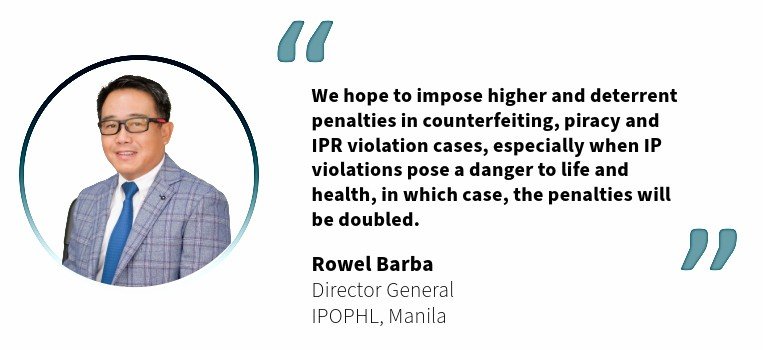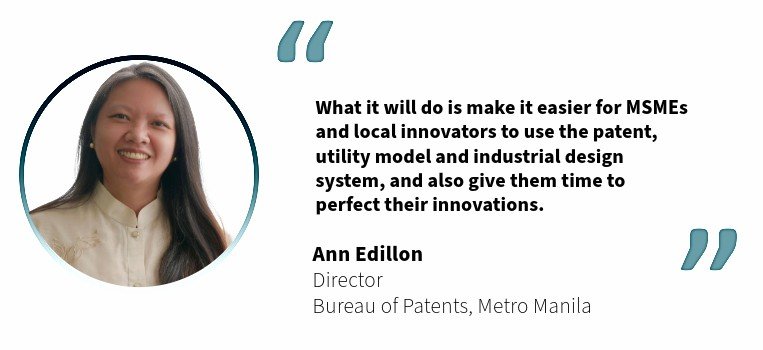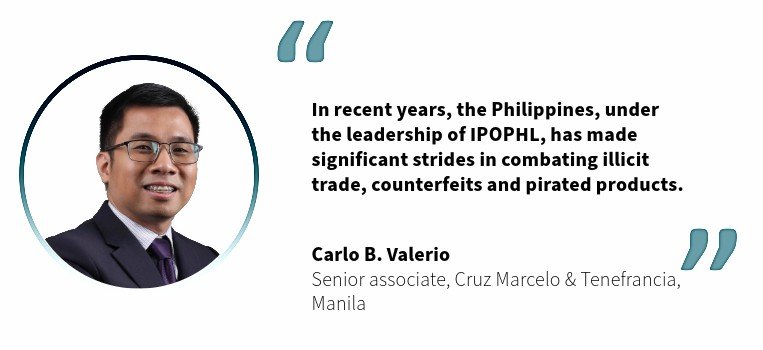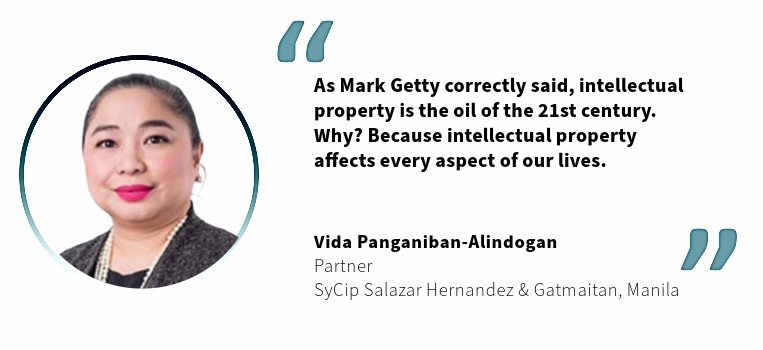A call for a stronger IP code in the Philippines
08 September 2024

To bolster the fight against counterfeiting and piracy, the Intellectual Property Office of the Philippines (IPOPHL) is pursuing amendments to the IP code. Excel V. Dyquiangco discusses the changes across various IP rights, as well as the impacts on businesses, innovation and investment.
The Intellectual Property Office of the Philippines (IPOPHL) is actively pursuing amendments to the current intellectual property code, aiming to enhance the protection and enforcement of IP rights in the country. These changes seek to bolster the fight against counterfeiting and piracy while maintaining a balance between IP rights holders and public interests.

IPOPHL director general Rowel S. Barba emphasized the need for stronger enforcement capabilities to address counterfeiting and piracy effectively. “We seek to undertake stronger enforcement functions,” he stated. The proposed changes include “temporary and permanent site blocking orders, takedown orders, cease-and-desist or disable access orders to intermediary service providers, domain name registries and registrars, online intermediaries, online platforms and social media platforms.”
Barba also highlighted the introduction of a solidary liability provision, which would apply to manufacturers, distributors and sellers of counterfeit goods, including those operating on online and social media platforms. “We hope to impose higher and deterrent penalties in counterfeiting, piracy and IPR violation cases, especially when IP violations pose a danger to life and health, in which case, the penalties will be doubled,” he said.
To support these enhanced enforcement measures, Barba shared that IPOPHL plans to expand its current IPR Enforcement Office (IEO) and IP Academy into full-fledged bureaus. In addition, the amendments propose the institutionalization of the National Committee on Intellectual Property Rights (NCIPR), a 15-member inter-agency body coordinating government efforts against IP rights violations.

Key changes across various IP rights
The proposed amendments also target specific aspects of different IP rights, aiming to align with international best practices. For patents, Barba noted: “We are looking at the adoption of the international best practice of provisional patent application to claim early priority date while the inventor is finalizing the patent application. In addition, we also seek to allow parallel filing of applications for protection of inventions through patent and utility model.”
For trademark applications, he said: “The amendments seek to allow registration of non-visual marks as part of the Philippines’ commitment to the Regional Comprehensive Economic Partnership (RCEP) Agreement, a 15-member Asia-Pacific free trade agreement aimed to transform the regions to a more modern economic trade system.”
Under the proposed amendments for copyright, IPOPHL aims to “prescribe a clear rule for the use and exploitation of orphan works, rationalize copyright registration and deposit, and recognize extended collective licensing.” For industrial design, the amendments would allow the protection of partial designs and streamline the registration process by granting the Bureau of Patents (BOP) director authority to issue registrations in the absence of adverse information.

The changes also address concerns related to technology transfer agreements by revising mandatory and prohibited clauses to support business interests. Barba added: “To make administrative recourse of IP disputes more accessible to [micro, small and medium enterprises] (MSMEs), we included enhanced administrative remedies and IP dispute resolution that expand the jurisdiction of the adjudication and IP dispute resolution function. As such, we also included the institutionalization of alternative dispute resolution in IPOPHL.”
BOP director Ann N. Edillon reassured that the proposed amendments would not hinder public access to innovations. “What it will do is make it easier for MSMEs and local innovators to use the patent, utility model (UM) and industrial design (ID) system, and also give them time to perfect their innovations,” she said.
Barba echoed this sentiment, emphasizing that the amendments aim to foster a more robust IP environment without compromising public access. “The amendments will preserve the balance between the rights of IP owners and the public in general,” he said, citing provisions related to the Trade-Related Aspects of Intellectual Property Rights (TRIPS) Agreement flexibilities and the Universally Accessible Cheaper and Quality Medicines Act.

Impacts on businesses, innovation and investment
The proposed stronger IP code is expected to have significant benefits for businesses operating in the Philippines. Barba said: “We can provide more deterrent measures not just against counterfeiting and piracy but also other IP violations, particularly those that threaten life and health. The amendments will preserve the balance between the rights of the IP owners and the public in general as it maintained provisions relating to the TRIPS Agreement flexibilities and the Universally Accessible Cheaper and Quality Medicines Act, among others.”
He said that these changes aim to foster a more robust and dynamic IP environment in the Philippines, signalling the government’s commitment to the protection of innovative and creative works of creatives, innovators and businesses alike.
He was quick to note: “However, we still see some drawbacks posed by landlord liability clauses that would require proactive measures from establishments, companies and platforms to ensure compliance with IP laws, rules and regulations.”
He added: “IPOPHL functions on a limited number of personnel to implement the amendments; hence, we proposed the creation of additional bureaus and positions. Furthermore, the rapid advancement in technology that is available for IP violators requires the need for enhanced competencies and corresponding tools and resources for law enforcement.”
Despite these challenges, Barba expressed optimism about the timeline for the amendments’ approval. “While the bills are already pending in the congress, IPOPHL hopes that the congress will be able to pass the law within the current administration,” he stated.
Building on momentum
“In recent years, the Philippines, under the leadership of IPOPHL, has made significant strides in combating illicit trade, counterfeits and pirated products,” said Carlo B. Valerio, senior associate at Cruz Marcelo & Tenefrancia in Manila. “The country has received accolades for leading the ASEAN in its anti-piracy efforts through the ASEAN Working Group on IP Cooperation (AWGIPC). Moreover, IPOPHL’s initiatives have kept the Philippines off the U.S. and EU blacklists in recent years. With a whole-of-government approach, IPOPHL has collaborated with member agencies of NCIPR to seize counterfeit goods, monitor and enforce IP rights in the digital space, and conduct awareness drives.”
He added: “We must build on this momentum to ensure these efforts translate into tangible economic gains and enhanced IP culture and awareness in the country. Amending the IP code and strengthening IPOPHL’s enforcement powers is crucial in achieving this goal.”
Vida Panganiban-Alindogan, a partner at SyCip Salazar Hernandez & Gatmaitan in Manila, shared this sentiment. She emphasized IP rights have gained significant prominence and become integral to economic activity and market competition, especially during this digital age. “As Mark Getty correctly said, intellectual property is the oil of the 21st century. Why? Because intellectual property affects every aspect of our lives. Consequently, the protection of intellectual property rights has become crucial. Counterfeiting undermines these rights, discouraging creativity, innovation and investment in new products and technologies. This not only leads to significant revenue losses for legitimate businesses but also affects their brand reputation, profitability and ability to invest in future innovations. Additionally, counterfeiting can result in job losses and negatively impact the broader economy,” she said.
She continued: “More critically, counterfeit products, particularly in industries like pharmaceuticals, electronics and food, pose serious dangers to consumer safety. Given these concerns and considering that IPOPHL is the lead agency governing the country’s intellectual property regime, it is essential for IPOPHL to be granted stronger enforcement powers to effectively combat counterfeiting and piracy.”
Crucial IP rights
Valerio emphasized that strong IP protection is vital not only for IP lawyers like himself but also for the clients he represents. “The legal regime for securing IP protection and commercializing IP assets is only effective if right holders can enforce their rights,” he explained. “Failure by the government and the courts to enforce these rights could lead to increased piracy, a flood of counterfeit goods and a lack of trust in the country’s IP system. By equipping IPOPHL with the necessary tools to promote IP protection and enforcement, we can enhance the Philippines’ IP system and, ultimately, its economy. An IP-aware and empowered society will drive growth through research and development, attract investments and facilitate the movement of goods between economies. This environment is highly beneficial for our IP rights holders – whether they are inventors, designers, brand owners or artists – and corporate clients alike.”
“The legal regime for securing IP protection and commercializing IP assets is only as good as the right holder’s ability to enforce their IP rights,” said Panganiban-Alindogan. “The government and the court’s inability to enforce IP rights will consequently lead to more piracy, flooding the market with counterfeit goods, and distrust in the IP system of the country. Arming IPOPHL with the right tools to promote IP protection and enforcement will certainly improve the country’s IP system and the Philippine economy in the long run.”
She further said: “As an IP practitioner, I believe that having an IP-aware and enabled citizenry will accelerate the country’s growth through research and development and will also attract investments and facilitate the movement of goods between economies. This is the kind of economy that is favourable to our IP rights holders (inventors, designers, brand owners and artists) and corporate clients.”
Looking towards the future, both Valerio and Panganiban-Alindogan are optimistic about the ongoing efforts to strengthen IP in the Philippines.
“IP stakeholders in the country, led by IPOPHL, have been working diligently to establish a robust IP system rooted in protection, commercialization and enforcement,” noted Valerio. “The constitution itself recognizes that IP is a key element for national development. By building and maintaining a strong IP framework, supported by a heightened IP culture and awareness, we can realize our aspirations for economic growth while preserving our cultural and artistic heritage. This is the vision that will guide our nation towards a prosperous and culturally rich future.”
Panganiban-Alindogan added: “Various IP stakeholders in the country, led by IPOPHL, have been working tirelessly to build a strong IP system founded on the bedrock of IP protection, commercialization and enforcement. No less than the constitution has acknowledged that this is a main ingredient for national development. Once we are able to build and maintain this system, supported by a robust IP culture and awareness in the country, we will be on our way to achieving our country’s aspirations for economic growth while maintaining our soul as a nation through our culture and the arts.”






